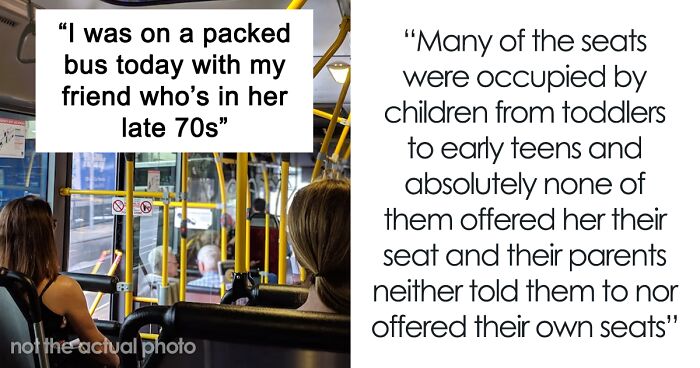
Woman Complains None Of The Kids On A Bus Offered Their Seat To An Elderly Passenger, Gets Perspective
InterviewThe interior of public transportation can be a sort of microcosm of human behavior. With just a few passengers, you can see old and young people, students, workers, and pensioners, all together. Naturally, this brings with it a degree of friction as expectations and parenting clash.
One woman started a debate online when she stated her frustration with parents who don’t make their kids give up seats to the elderly or people with difficulties standing. We got in touch with parenting experts and psychologists Caitlin Slavens and Chelsea Bodie to learn a bit more about why some parents struggle and what can influence a kid’s behavior.
More info: Instagram
There used to be an expectation that children and young people would give up their seats for the elderly
Image credits: rüveyda (not the actual photo)
So one netizen expressed her disappointment that many parents wouldn’t make their kids do anything
Image credits: Alexander Isreb (not the actual photo)
Image credits: DesolationRow
Ultimately, there are a multitude of factors that might shape what a child chooses to do or avoid
While it’s true that times change, it’s not like giving up a seat was some ancient custom most people don’t remember anymore. OP noticed that not only were kids ignoring people who might have difficulty standing, their parents weren’t even trying to rectify the situation. So Bored Panda got in touch with parenting experts and psychologists Caitlin Slavens and Chelsea Bodie to hear more about what influences a child’s behaviors and values. “There can be cases where behavior is more challenging that is more independent from the environment, they are raised in. There are several factors under both nature and nurture that impact a child’s development and behavior. While we know that parenting has a crucial role in shaping a child’s behavior there are additional factors to consider. This includes temperament, developmental age, genetic predispositions, mental health diagnoses, and personality traits.”
“For further consideration, we would also consider the genetic or biological factors that can influence behavior. Such as medical concerns, mental health challenges (such as attention-deficit/hyperactivity disorder, conduct disorder, oppositional defiance disorder, or autism spectrum disorder), or learning disabilities, that impact neurological function or other factors that would have an influence on behavior. There are other social and environmental factors that may influence a child that is outside a parent. This would include school, peer, or traumas (I.e., Reactive Attachment Disorder),” they added, showcasing the long list of things that could influence what a child does before a parenting style even comes into play.
Parents already have their work cut out for them in the 21st century
And it probably doesn’t come as a surprise to anyone that parenting is not an easy task, so we were curious to hear what they thought were common mistakes. “Overlooking oneself and one’s needs. Parents often are limited on time and neglect even their own basic needs. It is important to try to find ways (even small) to take care of yourself too. We know not everyone can ask for help, but it is important to reach out if you need to. That can look so different for everyone. Whether that is a family member or friend, a medical professional in your community, or an online community. Finding resources and different ways that you feel you can ask for help are important.”
“Raising a child in the age of social media can be a double-edged sword. Parents often find themselves inundated with information. It is important to know that information shared online is not tailored to your specific family’s needs. It is important to take what works for you and leave the rest.” Caitlin Chelsea shared that their book, “Not Your Mother’s Postpartum Book: Normalizing Post-Baby Mental Health Struggles, Navigating #MOMLife, and Finding Strength Amid the Chaos” will be released on January 17th, 2023, and it could be a good resource for parents needing more advice. You can also find their site here and Instagram here.
Ultimately, while there is no rule or law dictating that a person give up a seat, it’s a good test of one’s values. Doing something because of fear of punishment isn’t an indicator of a moral compass while doing a “good deed” without expecting a reward is. The burden of creating a functional moral compass does ultimately fall on the parents, who, let’s face it, often need all the help they can get.
Readers shared their thoughts and generally agreed with OP’s frustrations
Explore more of these tags
My uncle gave up his bus seat for an elderly. lady. He was fired after she crashed the bus and my uncle was never able to find work as a bus driver again.
One time, when I got up to offer my seat to another passenger, a boy in his early teens sat on it. I politely told him that I meant to offer the seat to the elderly woman beside us and explained that "older people's bones are more fragile, so if they fall down, they're more likely to get injured." He immediately got up - probably wasn't thinking when he grabbed the seat. My mother taught me to be calm and courteous in these situations.
It sounds like he might reflect on your explanation. I dare say that whilst he has been growing up throughout his formative years, that no one had taken a few minutes to talk to him about why we offer to help others. Now it's up to him. He has some understanding to base his future decisions on. Hopefully he went home + initiated a conversation about this type of situation + encouraged his family to think of various circumstances where others might need assistance + as a family that can help work out ways to speak up when out + about. Next time, he might be that calm assertive voice that asks a fellow passenger if they prefer to sit - whether it's an older person, a mother with a baby + toddler in tow or a pregnant woman etc
Load More Replies...Hilariously, the way OP worded their post, they made it sound like THEY got a seat, but their 70-year-old companion didn’t. I’m sure that wasn’t the case and it was that neither of them got to sit, but the way OP worded it made it sound like the 70-year-old was the only one left without a seat XD
My uncle gave up his bus seat for an elderly. lady. He was fired after she crashed the bus and my uncle was never able to find work as a bus driver again.
One time, when I got up to offer my seat to another passenger, a boy in his early teens sat on it. I politely told him that I meant to offer the seat to the elderly woman beside us and explained that "older people's bones are more fragile, so if they fall down, they're more likely to get injured." He immediately got up - probably wasn't thinking when he grabbed the seat. My mother taught me to be calm and courteous in these situations.
It sounds like he might reflect on your explanation. I dare say that whilst he has been growing up throughout his formative years, that no one had taken a few minutes to talk to him about why we offer to help others. Now it's up to him. He has some understanding to base his future decisions on. Hopefully he went home + initiated a conversation about this type of situation + encouraged his family to think of various circumstances where others might need assistance + as a family that can help work out ways to speak up when out + about. Next time, he might be that calm assertive voice that asks a fellow passenger if they prefer to sit - whether it's an older person, a mother with a baby + toddler in tow or a pregnant woman etc
Load More Replies...Hilariously, the way OP worded their post, they made it sound like THEY got a seat, but their 70-year-old companion didn’t. I’m sure that wasn’t the case and it was that neither of them got to sit, but the way OP worded it made it sound like the 70-year-old was the only one left without a seat XD

 Dark Mode
Dark Mode 

 No fees, cancel anytime
No fees, cancel anytime 






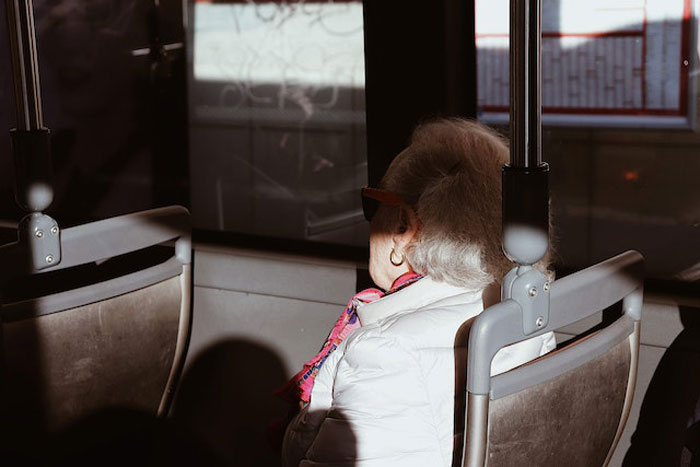
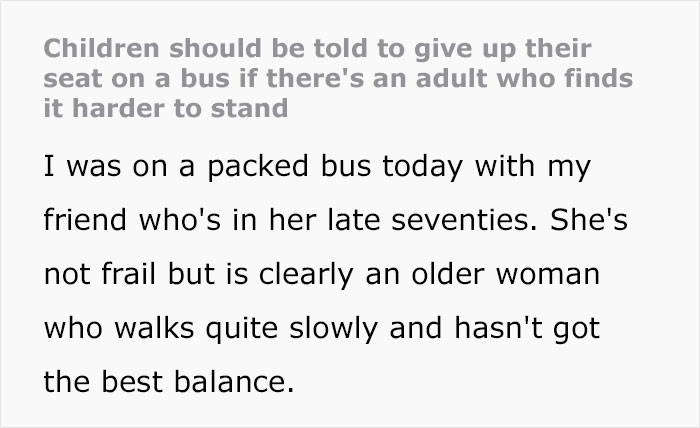

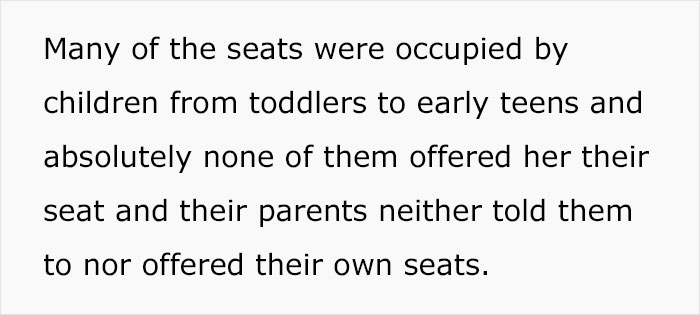
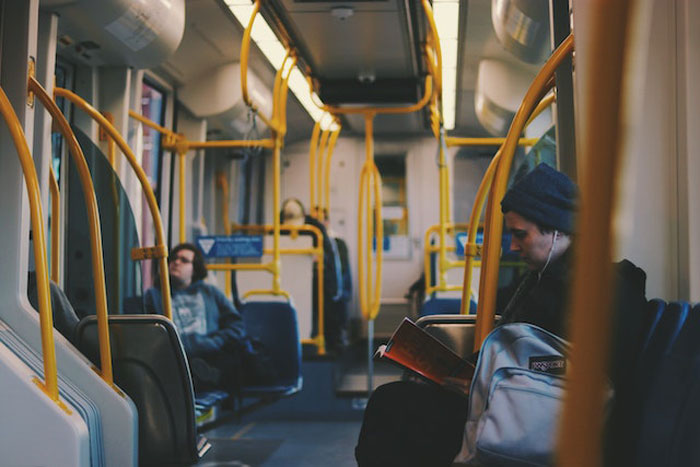

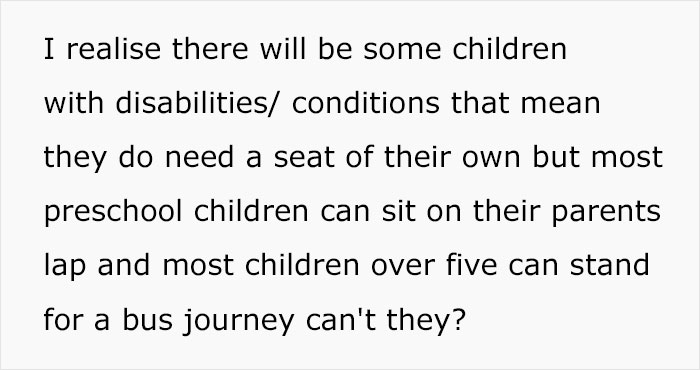
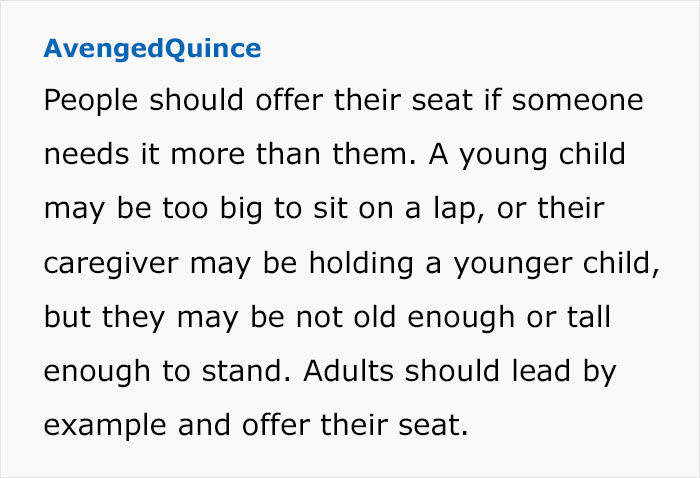
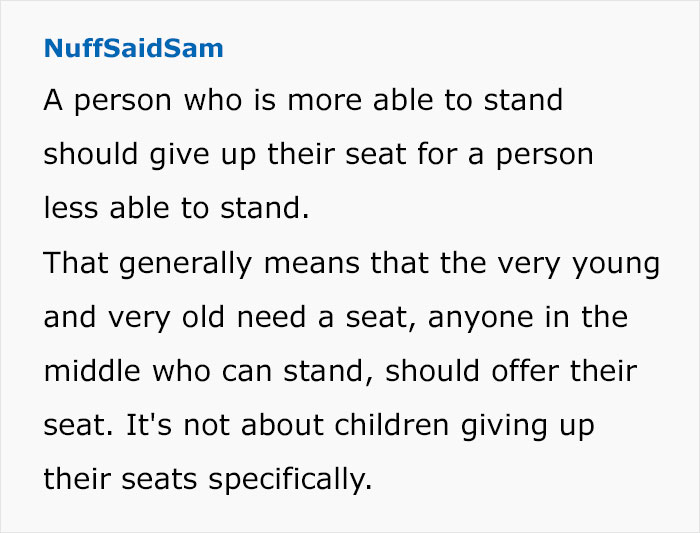



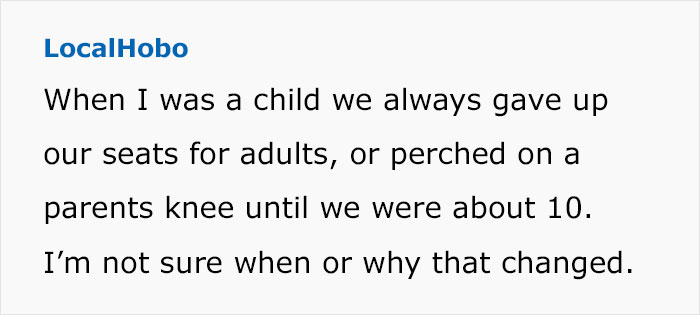
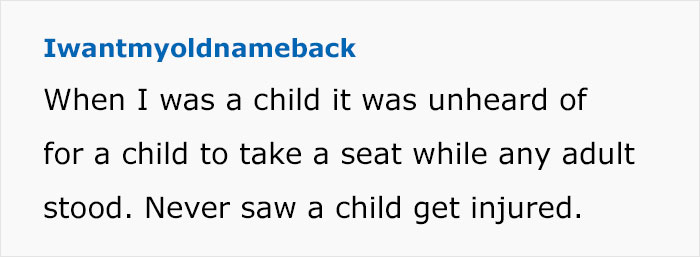
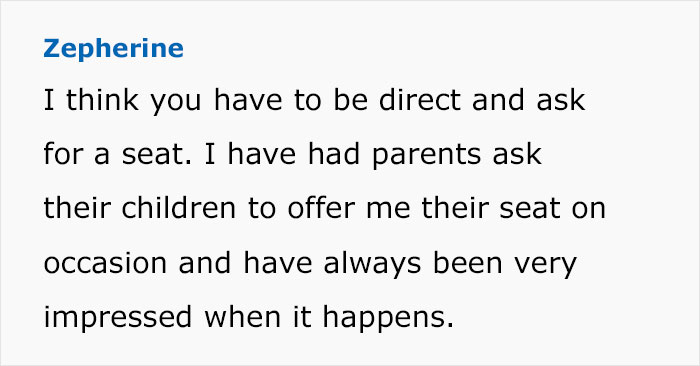
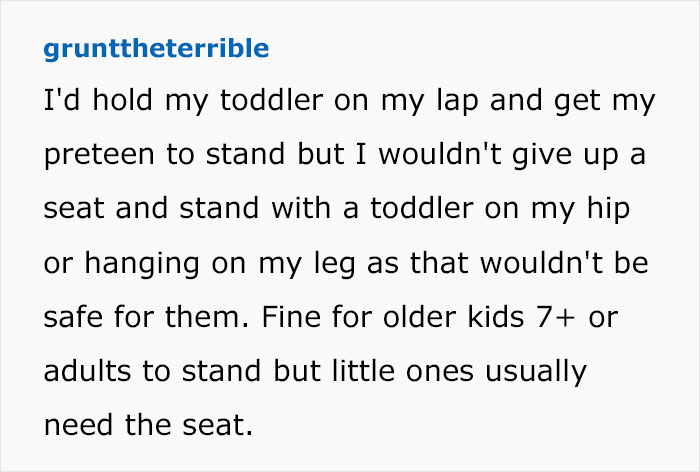
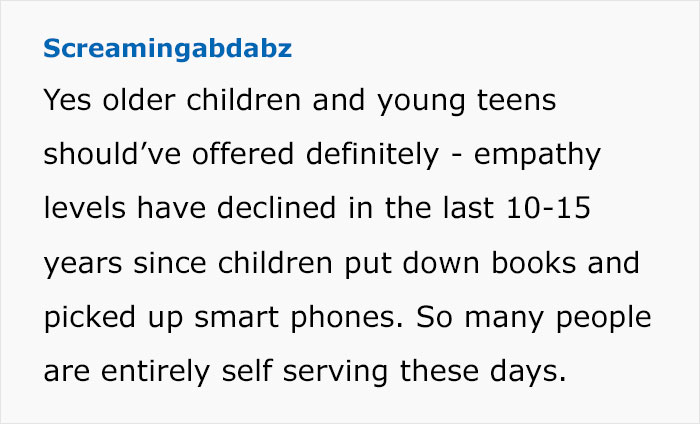
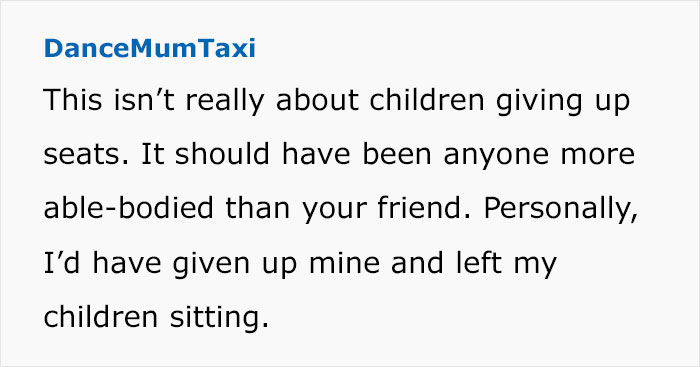

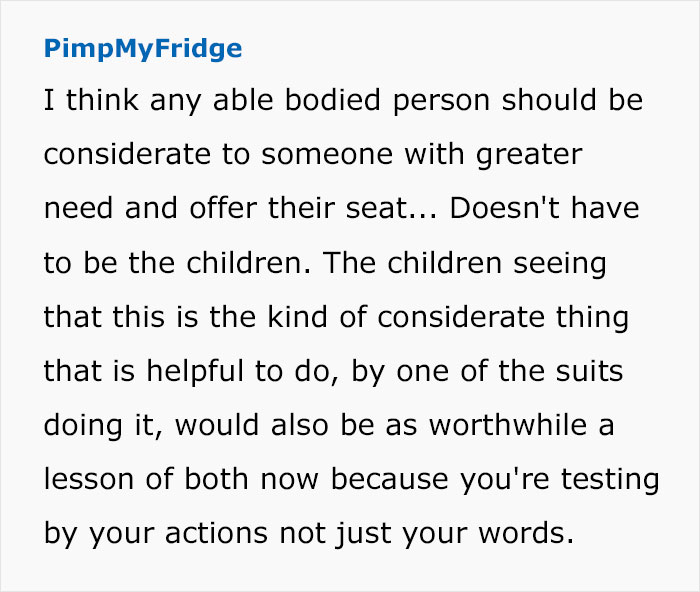
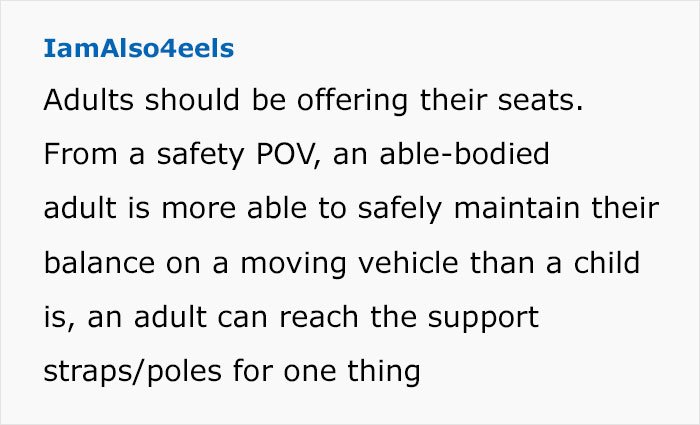
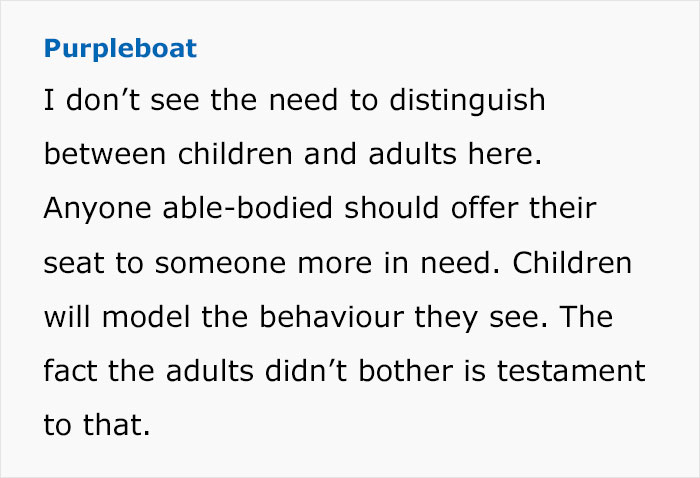












































70
176